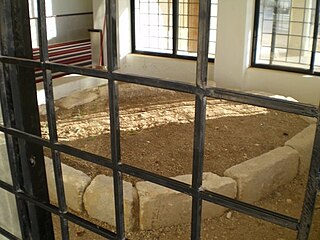
The Mushrikites were the Arab polytheists who opposed the Islamic prophet Muhammad and his Muslims in the early 7th century. They were worshippers of many idols. Their leaders were mostly from the Quraysh, but others also belonged to the Qays.

ʿAbd al-Raḥmān ibn ʿAwf was one of the companions of the Islamic Prophet Muhammad. One of the wealthiest among the companions, he is known for being one of the ten to whom Paradise was promised according to Sunni Muslims.
Saʿīd ibn Zayd,, also known by his kunyaAbūʾl-Aʿwar, was a companion of the Islamic prophet Muhammad and a brother-in-law of Umar.
Amr ibn Hisham (Arabic: عَمْرو بن هِشَام, romanized: ʿAmr ibn Hishām; also known as Abū Jahl c. was the Meccan Qurayshi polytheist leader of the Mushrikites known for his opposition to the Islamic prophet Muhammad. He was the most prominent flag-bearer of opposition towards Islam.
Sumayya, was the first member of the Umma (community) of the Islamic prophet Muhammad to become a shahida (martyr), shortly before her husband Yasir ibn Amir was also martyred for his conversion to Islam. Her full name is said to be Sumayya bint Khabbat or Sumayya bint Khayyat. Her son was Ammar ibn Yasir.
Yasir ibn Amir ibn Malik al-Ansi was an early companion of the Islamic prophet Muhammad. He is the second martyr in Islam, with the first being his wife, Sumayya.
Zayd ibn al-Khaṭṭāb was a companion of the Islamic prophet Muḥammad and a brother of Umar ibn al-Khattab, the second Islamic caliph.
Ṣafwān ibn Umayya was a sahabi (companion) of the Islamic prophet Muhammad.
Abd Allah ibn Sa'd ibn Abi al-Sarh was an Arab administrator, scribe, and military commander, who was an early convert to, then later apostate from Islam. He was a scriber of the Quran and governor of Upper Egypt for the Muslim caliphate during the reign of ʿUthmān (644–656). He was also the co-founder of the Islamic navy which seized Cyprus (647–649) and defeated a Byzantine fleet off Alexandria in 652.
ʿUtbah ibn Rabīʿah, also known as Abū al-Walīd was one of the prominent pagan leaders of the Quraysh during the era of Muhammad. He was the father of Abu Hudhayfa ibn 'Utba, Walid ibn Utbah, Hind bint Utbah and father-in-law of Abu Sufyan ibn Harb. Utbah was killed by Hamza ibn Abdul-Muttalib in the Battle of Badr.
Abū al-ʿĀṣ ibn al-Rabīʿ, was a son-in-law and Companion of the Islamic prophet Muhammad. His original name was said to have been Hushaym or Yasser.

Suhayl ibn ʿAmr, also known as Abū Yazīd, was a contemporary of the Islamic prophet Muhammad, and a prominent leader among the Quraysh tribe of Mecca. Clever and articulate, he was known as the Khatib (orator) of his tribe, and his opinion carried great weight among them. He brokered the famous Treaty of al-Hudaybiya with Prophet Muhammad on the side of Quraysh in 628AD.
Following the migration and return of the most Sahabas from the first migration to Abyssinia, the Muslims continued to suffer Persecution by the Meccans. This time, in 6 BH (615 CE) almost one hundred Muslims made a second migration back to Abyssinia where they stayed protected.
Saʽd ibn ʽUbadah ibn Dulaym Al Ansari was the chief of the Sa'ida clan of the Khazraj tribe in Medina in the early seventh century. He was later recognised as the chief of the whole Khazraj tribe, and then of all the Ansar. He was a prominent companion of the Islamic prophet Muhammad and he made an abortive attempt to nominate himself as caliph of Islam after Muhammad's death.
Ḥamza ibn ʿAbd al-Muṭṭalib was a foster brother, paternal uncle, maternal second-cousin, and companion of the Islamic prophet Muhammad.
ʿUbayda ibn al-Ḥārith was a relative and companion of the Islamic prophet Muhammad. He is known for commanding the expedition in which Islam’s first arrow was shot and for being the first Muslim to be martyred in battle and third ever in Islam.
Sakhr ibn Harb ibn Umayya, commonly known by his kunyaAbu Sufyan, was a prominent opponent-turned companion and father-in-law of the Islamic prophet Muhammad. He was the father of the first Umayyad caliph Mu'awiya I and namesake of the Sufyanid line of Umayyad caliphs which ruled from 661 to 684.
Abū Umayya ibn Al-Mughīra, whose original name was Suhayl and whose by-name was Zād ar-Rākib was the chief of Mecca in the early seventh century.
Al-ʿĀṣī ibn Suhayl, better known as Abū Jandal, was a companion of the Islamic prophet Muhammad, who was the first person returned to Mecca after the Treaty of Hudaybiyyah. Abu Jandal was also the brother of Abdullah ibn Suhayl and son of Suhayl ibn Amr, the orator of Quraysh.
Umm Kulthūm bint Jarwal, also known as Mulayka, was a wife of Umar and a companion of Muhammad.


